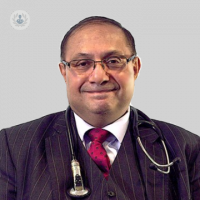Dementia and memory loss: is your forgetfulness age or dementia-related?
Written in association with:As a specialist in dementia, patients often ask me the question: “is my memory fading?” Or they say, “my memory isn’t as good as it used to be”.
People experience natural memory impairment as they age. It happens in some individuals, not everyone. Many people jump to the conclusion that they have dementia but there are other types of memory loss that aren’t as severe as the most common type of dementia.

Firstly, I’ll explain two common non-dementia-related types of memory loss
- Benign essential forgetfulness
- Pseudo dementia
Then, I’ll explain dementia and the most common types of dementia
- Alzheimer’s disease
- Vascular dementia
- Lewy body dementia
Benign essential forgetfulness (not dementia)
Sometimes, people have a minor slowing of their memory as they age. We call this ‘benign essential forgetfulness’ in the medical world.
We can all get “senior” moments as we get older. Think of moments where you can’t remember someone’s name or a phone number, or when you can’t place how you know someone you see in the street. Naturally, people worry and think “am I losing my memory? I’m becoming more forgetful”, but these small occurrences alone do not guarantee that you have dementia .
Think of the brain like an ageing computer
The way I explain memory and ageing is that as we age, the brain spends more time in search mode. It’s like having an old computer: the brain takes longer to search for information. In comparison, the brain of someone younger is more like a brand new computer in the sense that the ‘search engine’ is faster.
Pseudo dementia (not dementia)
Pseudo dementia occurs when people have severe depression and often cannot think straight. As a result, they experience features of what some people describe as memory loss e.g.
- Not remembering to shave
- Not looking after their external appearance
- They can look unkempt like demented patients do
- They’ve not brushed their teeth in a long time
Once we treat the depression, patients and their memory become much better. There are two types of depression: reactive depression and endogenous depression.
Reactive depression
Reactive depression occurs due to a specific situation (e.g. if a person loses their spouse or their parents, if they lose their job etc.), then they may get reactive depression. Once they overcome the sadness or learn to cope with it, their memory improves.
Endogenous depression
In someone with endogenous depression, everything may be seemingly fine (e.g. they have a nice family, a nice job and a nice car, etc.) but they really are depressed. This is a problem that needs careful evaluation by a specialist like myself to determine what’s happening. There are different layers to this problem.
Dementia
Dementia is the main cause of memory loss. I use the term “dementia” very consciously because it’s attached to a taboo - people don’t want to admit they have dementia.
People often say “I don’t want to bother the doctor” but they should come and see us. Understandably, people don’t want to face dementia, but we need to break the taboo. Many people with dementia can still be fine, go out, meet friends, and go on holidays. It is possible to have dementia and continue living a normal life.
Dementia can go unnoticed until someone is taken out of their normal environment. Think of someone managing fine in their home. For example, someone with early-stage dementia might cope easily when making a cup of tea (they have no problem using the kettle and getting milk out of the fridge) but, if they went on holiday, that’s when the penny drops because they’re out of their environment – they become lost. They might have difficulty finding the toilet or their bedroom.
Alzheimer’s disease
Alzheimer’s disease is the most common cause of dementia – it accounts for 70 per cent of cases. The condition can often be triggered by a fall, a urine infection or constipation.
A “second childhood”
The main thing to say about this condition is that it’s very insidious. What normally happens in people with Alzheimer’s disease is that a person becomes disengaged, and it’s as if they go through a “second childhood”. Sometimes, patients have been coping quite happily in their home and then eventually, family members (and specialists) agree that the person can’t be left alone in their house because it’s unsafe.
For example, we know that a child can think about themselves, eat, play and go to bed, but they can’t be expected to look after people. This can eventually be the exact same feeling about someone with Alzheimer’s.
A change in personality
Alzheimer’s disease sufferers might also become difficult, rude and demanding because they are thinking about life from only their perspective. They might lose some social skills and the finesses of life (e.g. social tact and table manners).
Sometimes it’s hard to pick up because they might be on their best behaviour when visiting a GP. However, GPs can also pick up on Alzheimer’s if the person:
- Does not engage and won’t have a proper conversation
- Has poor eye contact
- Has poor speech
- Has difficulty answering yes or no questions
Vascular dementia
Someone with vascular dementia experiences tiny little strokes, which are referred to medically as transient ischaemic attacks (TIA). It’s a very insidious stepladder with intermittent memory loss.
Their health will deteriorate in a cycle: they’ll slightly deteriorate after one stroke, but then get better, then have another mini-stroke and get better. But the person suffering the strokes will never reach their previous level of health despite improving after each stoke.
I often say that with vascular dementia, the effect is like a scattergun approach. Some parts of the brain work extremely well, but others don’t. For example, if you ask a person with vascular dementia to do a crossword, they could do it much better than you but, at the same time, if you ask them to do a simple task, they may forget.
Lewy body dementia
The third type is dementia is Lewy body dementia. It fluctuates greatly and causes a vivid imagination. For example, one day a sufferer might think they’ve been in a war and that fighting is happening around them, but the next day, they’re fine.
People with Lewy body dementia can get better as quickly as they fall ill, and I mean very quickly. They get what we call “sundowning ” in the evening because the retina depends on sunlight, and when the sun suddenly sinks, they get sundowning and become worse in the evening – this is why they can become aggravated in the evening and worse in winter. Often, they somehow get a little bit better when it’s really sunny.
I explain how we can prevent, halt and manage dementia in my other article, “Modern dementia treatment: personalised medicine and the power of lifestyle adjustments”.
Early diagnosis is key
Don’t go through periods of denial and thinking “my memory is going but I’ll leave it for now”. Some people wait, and wait, and wait to deal with the issue until they in a more serious situation e.g. they have a bad fall or they’re wandering lost in the street.
If someone comes to us for symptoms and is diagnosed with dementia, we can get them back on their feet much quicker. Whether you do or don’t have dementia, it’s always good to ask a specialist so that we can reassure you, treat you, and point you in the right direction.
Do you have concerns about your memory? Dr Mashkur Khan has spent more than 25 years diagnosing and treating dementia. Visit his profile to learn how he can help you.


